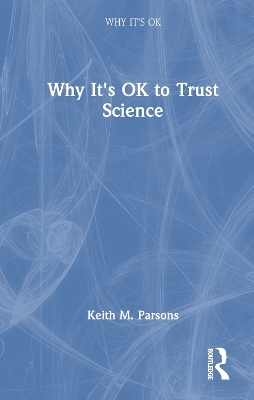
Why It's OK to Trust Science
Seiten
2023
Routledge (Verlag)
978-0-367-61640-3 (ISBN)
Routledge (Verlag)
978-0-367-61640-3 (ISBN)
Why It’s OK to Trust Science is an unabashed defense of science, objectivity, and the essential value of both in our "post-truth" age, exploring the intellectual and historical roots of anti-science and presenting clear and cogent rebuttals to anti-scientific arguments.
Why trust science? Why should science have more authority than "other ways of knowing?" Is science merely a social construct? Or even worse: a tool of oppression? This book boldly takes on these and other explosive questions—lodged by ideologues on the left and the right—and offers readers a well researched defense of science and a polemic addressed to its detractors.
Why It’s OK to Trust Science critically examines the recent history of critiques of science, including those in academia from scholars like Bruno Latour, Simon Schaffer, and Thomas Kuhn. It then presents case studies drawn from recent advances in the field of dinosaur paleontology, showing how science generates objective knowledge, even during revolutionary episodes. The book next looks at how that same objective knowledge can be gained even when researching extremely complex issues, using climate science to distinguish between genuine skepticism –upon which science depends–from dogmatic denial.
The book is for anyone who needs thoughtful, razor sharp responses to the detractors of science—whether they be anti-vaxxers, climate change deniers, profit-seeking businessmen, or published relativists in the knowledge-making industries.
Key Features:
Highly readable and accessible without oversimplifying the complexities of scientific research
Exposes the many flaws of the "undertermination thesis"—the argument that indefinitely many hypotheses are compatible with any body of evidence
Explores whether moral and other value-laden questions can be answered by science
Includes three appendixes online: (1) Summary of The Structure of Scientific Revolutions; (2) Rorty on Losing the World; (3) 21 Facts in Support of Human-Caused Climate Change
Why trust science? Why should science have more authority than "other ways of knowing?" Is science merely a social construct? Or even worse: a tool of oppression? This book boldly takes on these and other explosive questions—lodged by ideologues on the left and the right—and offers readers a well researched defense of science and a polemic addressed to its detractors.
Why It’s OK to Trust Science critically examines the recent history of critiques of science, including those in academia from scholars like Bruno Latour, Simon Schaffer, and Thomas Kuhn. It then presents case studies drawn from recent advances in the field of dinosaur paleontology, showing how science generates objective knowledge, even during revolutionary episodes. The book next looks at how that same objective knowledge can be gained even when researching extremely complex issues, using climate science to distinguish between genuine skepticism –upon which science depends–from dogmatic denial.
The book is for anyone who needs thoughtful, razor sharp responses to the detractors of science—whether they be anti-vaxxers, climate change deniers, profit-seeking businessmen, or published relativists in the knowledge-making industries.
Key Features:
Highly readable and accessible without oversimplifying the complexities of scientific research
Exposes the many flaws of the "undertermination thesis"—the argument that indefinitely many hypotheses are compatible with any body of evidence
Explores whether moral and other value-laden questions can be answered by science
Includes three appendixes online: (1) Summary of The Structure of Scientific Revolutions; (2) Rorty on Losing the World; (3) 21 Facts in Support of Human-Caused Climate Change
Keith M. Parsons is Professor of Philosophy and Humanities, Emeritus at The University of Houston-Clear Lake. His books include God and the Burden of Proof (1989), Drawing Out Leviathan: Dinosaurs and the Science Wars (2001), and Bombing the Marshall Islands: A Cold War Tragedy (2017; coauthored with Robert A. Zaballa).
Introduction: What Has Science Done for me Lately?; 1: The "Science Wars" and Why They Had to be Won; 2: The Facts About Social Constructivism; 3: Thomas Kuhn: Foe of Science?; 4: Thomas Kuhn: Friend of Science?; 5: Can We Have Good Science and the Right Values?; 6: Dinosaur Revolutions; 7: How We Know About Big, Complex Things; Conclusion; Bibliography;
| Erscheinungsdatum | 29.07.2023 |
|---|---|
| Reihe/Serie | Why It's OK |
| Verlagsort | London |
| Sprache | englisch |
| Maße | 129 x 198 mm |
| Gewicht | 335 g |
| Themenwelt | Geisteswissenschaften ► Philosophie ► Ethik |
| Naturwissenschaften ► Biologie | |
| Sozialwissenschaften ► Pädagogik ► Schulpädagogik / Grundschule | |
| ISBN-10 | 0-367-61640-8 / 0367616408 |
| ISBN-13 | 978-0-367-61640-3 / 9780367616403 |
| Zustand | Neuware |
| Informationen gemäß Produktsicherheitsverordnung (GPSR) | |
| Haben Sie eine Frage zum Produkt? |
Mehr entdecken
aus dem Bereich
aus dem Bereich


